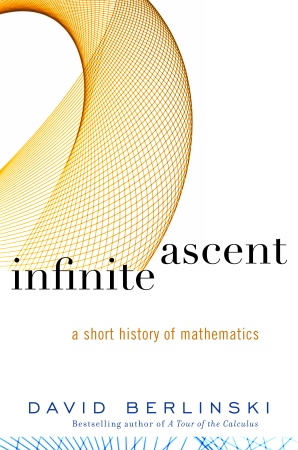Senior Fellow David Berlinski Explores the Fascinating History of Mathematics
 In Infinite Ascent, David Berlinski, the acclaimed author of The Advent of the Algorithm, A Tour of the Calculus, and Newton’s Gift, tells the story of mathematics, bringing to life with wit, elegance, and deep insight a 2,500-year-long intellectual adventure.
In Infinite Ascent, David Berlinski, the acclaimed author of The Advent of the Algorithm, A Tour of the Calculus, and Newton’s Gift, tells the story of mathematics, bringing to life with wit, elegance, and deep insight a 2,500-year-long intellectual adventure.
Berlinski focuses on the ten most important breakthroughs in mathematical history and the men behind them. Here are Pythagoras, intoxicated by the mystical significance of numbers; Euclid, who gave the world the very idea of a proof; Leibniz and Newton, co-discoverers of the calculus; Cantor, master of the infinite; and Gödel, who in one magnificent proof placed everything in doubt.
The elaboration of mathematical knowledge has meant nothing less than the unfolding of human consciousness itself. With his unmatched ability to make abstract ideas concrete and approachable, Berlinski both tells an engrossing tale and introduces us to the full power of what surely ranks as one of the greatest of all human endeavors.
Infinite Ascent is a Starred Kirkus Review
Not a formal history of math so much as a “good parts” version of that history.
After a nod to earlier civilizations, Berlinski (A Tour of the Calculus, 1995) begins with the Greeksin particular, with Pythagoras and Euclid. The Greeks’ sheer fascination with numbers and geometrical shapes, and their determination to construct logical proofs of their discoveries, set them apart from all earlier schools of mathematical thought. This questing spirit died out with the more pragmatic Romans, and Christian Europe had little more interest in pure math until the Renaissance. Then the introduction of Arabic numerals, and of the Greek mathematical discoveries kept alive by Arabic scholars, set off a new interest in math. Descartes learned how to map equations on a plane, and Newton and Leibniz independently created what Berlinksi considers one of the two key ideas of Western science: the calculus. Further progress involved moving from the simple counting numbers every child knows: Complex numbers, involving the square roots of negatives, were understood by Leonhard Euler; group theory was jotted down by the young French genius Galois the night before he died in a senseless duel; Lobachevsky and Riemann showed that there were consistent alternatives to Euclid’s common-sense geometry; and Cantor opened the doors to infinity, before which all previous mathematicians had halted in fear of their sanity. The 20th century contributed Gödel’s proof that no self-contained logical system can be both complete and consistent, as well as the algorithm, a tool that ranks with the calculus for sheer power. Despite a sometimes condescending tone, Berlinski spins his narrative clearly, colorfully and with surprising thoroughness in such a brief treatment.
Novices may be overwhelmed, but for the mathematically inclined, this is a real treat.
Praise from Publishers Weekly
No one knows for sure when mathematics went from being a functional
system for keeping track of sheep to a philosophical system that
transcended the objects it counted, but as well-known science writer
Berlinski (TOUR OF THE CALCULUS) tells readers, around 500 B.C.
Pythagorus elevated mathematics into a religion. It has kept its
near-mystical status ever since. (Even students instructed in its
arcane languages can only gape at how numbers dictated where missing
elementary particles like positrons and quarks were to be found.) Readers may have heard of the short-lived Evariste Galois, killed in a duel over a woman, but here they will come to understand his importance to group theory, his thoughts scribbled down the night before his death. Non-Euclidean geometry led to Einstein’s universe, and Berlinski introduces us to the German scientists who opened the door to multiverses: Gauss, Cantor and Riemann. Finally, we encounter Kurt Godel, who threw the acolytes of mathematics into a panic with his incompleteness theorem. Readers will need to remember some of their high school math to benefit from Berlinski’s discussions of calculus and complex numbers, but his engaging style should attract many readers, science buffs and generalists alike to this excellent entry in Modern Library’s Chronicles series. (On sale Sept. 6).
Accolades for Infinite Ascent
For mathematically challenged folk like me, David Berlinski comes again to help with a thin volume that, like his A Tour of the Calculus, renders mathematics not easy, but accessible and absorbing. He portrays through history how mathematical thought evolved, from the genius of the few to its application by the many. Personalities, times, cultures, and opportunities all play their dramatic roles and Berlinski, knowing how they interacted, brings them vividly to life. Youll enjoy yourself.
Paul McHugh, Distinguished Service Professor of Psychiatry, Johns Hopkins University
This is literary science at its best. I was charmed by this top-down and introspective presentation of the subject of mathematics. It is not just highly readable; because it is one step above the subject, it can even inspire the professional.
Nassim Nicholas Taleb, Deans Professor in the Sciences of Uncertainty, University of Massachusetts at Amherst, author of Fooled by Randomness
A humorous and graceful short history of mathematics, quite deceptively easy to read. Berlinski is actually a sophisticated insider, and every page of this book glows with his love of mathematics and with his sardonic appreciation for humanitys foibles.
Gregory Chaitin, IBM Thomas J. Watson Research Center, author of Meta Math! The Quest for Omega